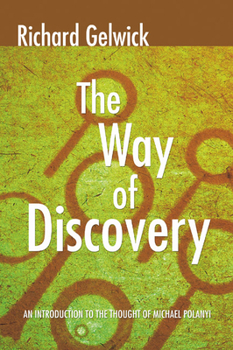The Way of Discovery
This book offers the first full exploration of the religious, ethical, and social dimensions of Michael Polanyi's philosophy, and its implications for the crisis of modern culture. Michael Polanyi... This description may be from another edition of this product.
Format:Paperback
Language:English
ISBN:1592446876
ISBN13:9781592446872
Release Date:May 2004
Publisher:Wipf & Stock Publishers
Length:200 Pages
Weight:0.75 lbs.
Dimensions:0.5" x 5.3" x 8.5"
Related Subjects
PhilosophyCustomer Reviews
1 rating
Even in Science, says Polanyi, Belief is the Basis for Knowing
Published by Thriftbooks.com User , 15 years ago
The Way of Discovery: An Introduction to the Thought of Michael Polanyi. By Richard Gelwick. (Wipf & Stock Publishers. Eugene, Oregon 1977) Polanyi's magnum opus, Personal Knowledge, is for the hearty reader. Gelwick focuses on its essential theme in a very readable style. That theme is the critique of the widely held notion that scientific knowledge, or any other form of knowledge, is, or can be, "objective knowledge." In Personal Knowledge, as Gelwick explains, Polanyi advocates the complete abandonment of that notion, and its replacement with the theory of "personal knowledge." Much of Gelwick's book reviews Polanyi's arguments. One of Polanyi's points is that the theory of knowledge as "objective" tries to separate knowledge from the knower. But for Polanyi this is not only a complete distortion of the actual nature of human knowledge, it is a self-alienating absurdity. How can there be knowledge without a person as knower? Indeed, as Gelwick makes clear, Polanyi centers the creation and existence of knowledge on the individual knower. In actuality, each knower is the central figure in the process of absorbing sense experience, and integrating that with his or her prior knowledge -- as learned through socialization, education, and, for professionals, specialized training. This process of integration is creative, and involves the whole person. The theory of knowledge as somehow "objective" entails a covert effort to escape responsibility for what one knows, as if, for example, scientific discovery and testing did not involve the personal judgments, skill, and intelligence of the individual scientist. The knowledge that each person has is what he or she personally accredits, and personally chooses to believe to be true. Besides being factually false, the theory of objective knowledge has a corrosive affect on human civilization. It "objectifies" human nature, thereby reducing the value of the individual to that of a machine. Such de-humanization provides no moral barriers, and thus eases the way for political domination, exploitation, and even war. Polanyi's theory of personal knowledge encourages the cultivation of empathy, and the sense of human oneness. It elevates human value. If integrated into modern culture, it would help to humanize our science-based civilization. Gelwick uses the term "heuristic philosophy" to characterize Polanyi's position. Although suggested over 30 years ago, that term hasn't caught on. "Creative philosophy" seems catchier to me. But why not just say "philosophy of personal knowledge"? Gelwick's book fails to discuss the implications for social science of Polanyi's views, but Polanyi had an eye on reforming social science when he wrote. Gelwick also way overstates the influence Polanyi's philosophy has had on contemporary thought. One reason Polanyi's thought is so little known today is that, as Marjorie Grene and others have observed, it has been captured by Christians, and confi





